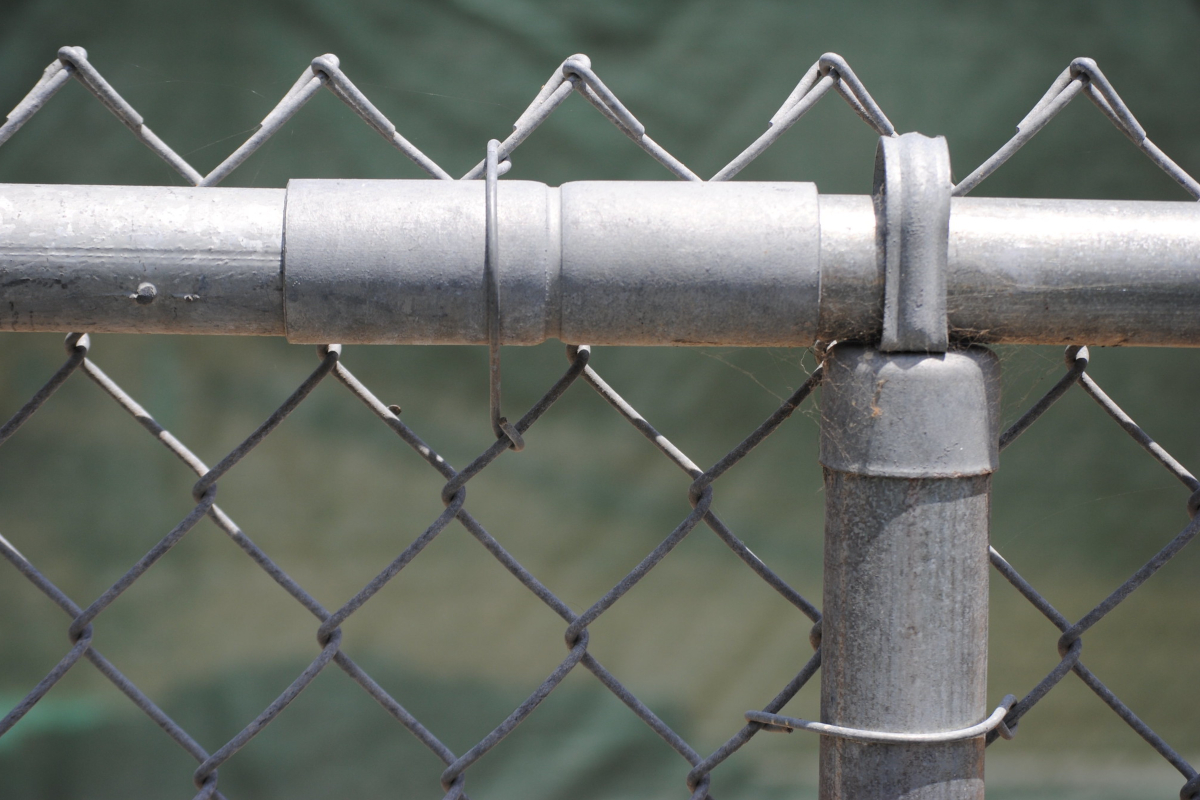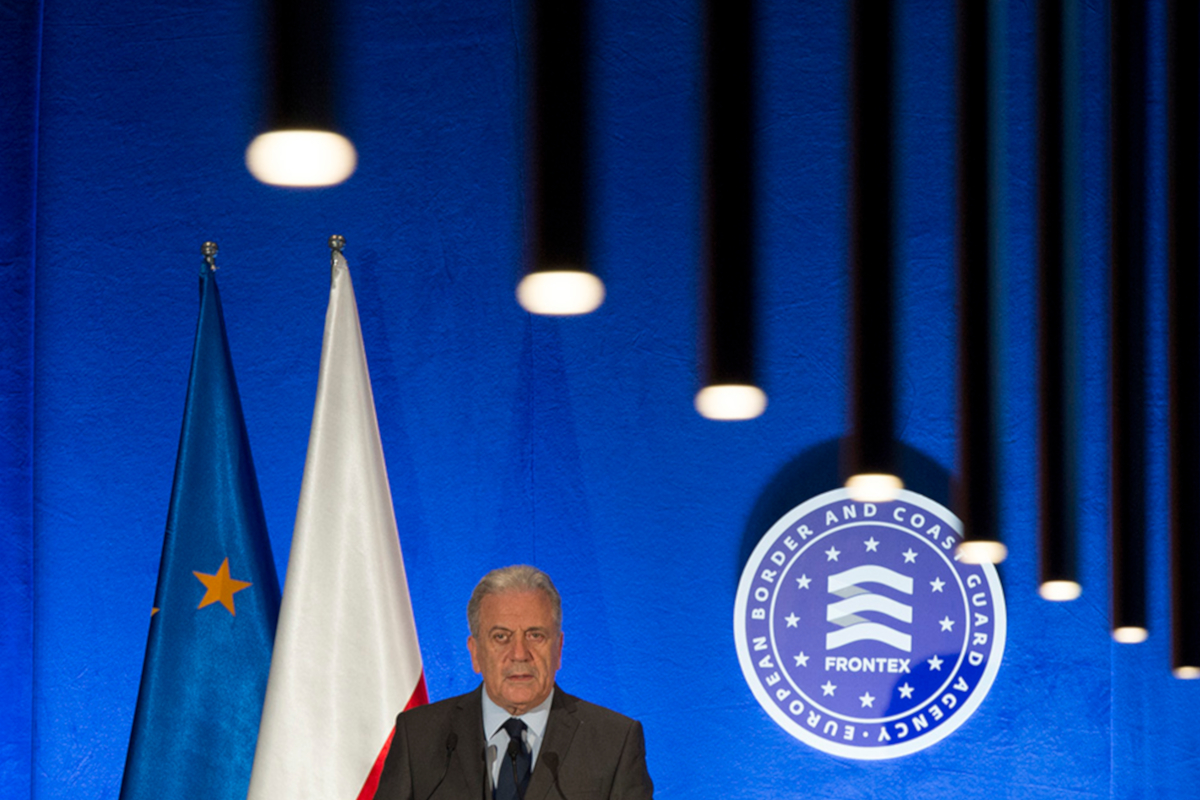Building walls, restricting rights: Lithuania's response to the EU-Belarus border 'crisis'
Topic
Country/Region
01 February 2022
After the ongoing politico-diplomatic clash between the EU and Belarus reached a peak in the summer of 2021, press attention turned towards the situation at the Polish-Belarussian border, where thousands of people arrived hoping to travel onwards to EU territory. However, the response from the Lithuanian authorities also merits examination: the country's efforts to prevent irregular arrivals have been widely supported by the EU, despite widespread allegations of fundamental rights violations.
Support our work: become a Friend of Statewatch from as little as £1/€1 per month.

By Yurema Pallarés Pla
This analysis looks at the actions of the Lithuanian authorities between July and December 2021, firstly presenting the legislative changes introduced in Lithuania to tackle irregular arrivals from Belarus, followed by a recounting of events on the ground and the situation in the Lithuanian asylum system. It continues with an overview of EU support to Lithuaniam focusing on Frontex and the European Asylum Support Office (EASO, now the EU Agency for Asylum), followed by conclusions.
Background: How did the EU’s eastern member states end up in this situation?
In August 2020, the presidential elections organised in Belarus resulted in the re-election of Alexander Lukashenko, in power since 1994, for a sixth term. Street demonstrations quickly emerged to protest against the results, which many citizens considered rigged. Independent international election observers from the Organisation for Security and Cooperation in Europe (OSCE) were not invited to oversee the elections.
In response, the EU called for an end to the violent repression of protests and refused to recognise the results. It imposed a series of sanctions against Belarus in the hope of forcing free and fair elections, the end of violence and repression and the start of an inclusive national dialogue. Pressure has been ongoing, with the most recent set of sanctions approved in January.
Sanctions only fostered tensions between the bloc and Belarus. In late May 2021 the Belarussian authorities forced the detour and landing of a Ryanair flight with a Belarussian dissident on board, who was arrested after the plane touched down in Minsk. This event triggered further sanctions from the EU and was followed by the unfolding of the situation at the border, with the Belarussian regime enticing and facilitating the arrival of non-nationals to the EU border (for example, by easing the issuance of visas).
Due to their geographical position Poland, Lithuania and Latvia have been the EU member states most exposed to these actions. Furthermore, they also host prominent Belarus opposition leaders – notably Svetlana Tijanóvskaya, who ran against Lukashenko in the elections and is now in exile in Lithuania.
Legalising unlawful behaviour
In response to the increasing numbers of people arriving across the land border with Belarus, the Seimas (Lithuanian parliament) approved legal measures to strip the right to apply for asylum, erode existing safeguards and militarise the border.
In early July, the Parliament declared that the country was in “a state-level emergency situation throughout the country due to a massive influx of foreigners.” The declaration was only the first of several legal changes adopted over the course of summer which have been deemed by international organisations and civil society to be inconsistent with the country’s obligations under EU and international law.
The first amendment introduced under the “emergency situation” affected the Alien’s Law. The Parliament, convened in extraordinary session on 13 July, approved limitations on accessing asylum procedures; extended the use of detention (up to six months); and restricted individuals’ access to information, interpretation, medical care and legal aid.
A second amendment to the Alien’s Law was approved on 10 August: asylum applications were now only to be accepted by the Lithuanian authorities in three scenarios:
- when submitted to the State Border Guard Service at an official border crossing point;
- when submitted to the Migration Department, provided that the applicant entered Lithuania legally; and
- when lodged outside Lithuania at a diplomatic mission or consulate.
The provision does, however, allow the State Border Guard Service to accept submissions from people who entered irregularly, depending on individual circumstances or their vulnerability.
Although the establishment of specific designated places to submit asylum applications is permitted under the EU’s Asylum Procedures Directive, this cannot be used to obstruct effective access to the asylum procedure. However, given the limited number of border crossing points between Lithuania and Belarus and the distance between them, this seems to be precisely the purpose of the amendment.
As the European Council on Refugees and Exiles (ECRE) noted in an exhaustive analysis on the legal changes in Lithuania, these amendments and the practices they permit are prone to lead to breaches of Lithuanian obligations as per international and EU law. This is the case in particular regarding arbitrary detention, disregard for the needs of vulnerable people (including children) and the provision of effective legal remedies.
Scenes from the ground
These legislative changes and the predominant ‘hybrid warfare’ discourse have enabled a truly hostile environment for asylum-seekers in Lithuania as elsewhere in the EU, in particular at its external borders. The principle of non-refoulement[1] is routinely violated and people are left at the border without adequate humanitarian and medical assistance.
In fact, Lithuania acted contrarily to an order from the European Court of Human Rights (ECHR) that called on the country to allow a group of Afghans to enter the country. The group in question had managed to enter Lithuania from Belarus after several attempts and were hiding from the Lithuanian authorities to avoid expulsion. Nevertheless, after being detected they were summarily removed. “We intend to not allow the illegal migrants into Lithuanian territory,” the Border Guard said.
This is far from being the only case of pushbacks recorded on Lithuanian territory. An incident involving the expulsion of two families from Afghanistan was also followed and reported on in detail by journalists in October.
Citing compliance with national law, Lithuanian authorities have not even tried to hide the tactics they use to avoid arrivals via the border with Belarus. Despite open statements about the kind of tactics used at the border to avoid people entering the country, authorities have also made it difficult for journalists and media to report from the ground. Consequently, several media outlets from Lithuanian signed a joint letter calling on authorities to let them report on what was happening at the border.
One of the reasons put forward by media outlets was that their presence was the only guarantee of dismantling Belarussian propaganda aimed at attacking Lithuania and spreading misinformation on developments at the border. However, it seems Belarus was not the only side capable of playing the disinformation card. When an Iraqi man was found dead near the border, the Belarussian authorities said they were launching an investigation, claiming he had been beaten so badly they could do nothing to help him. Lithuania quickly reacted, labelling the claims “fake news” as part of Belarus’ hybrid war. Between August and the end of December 2021, at least 21 deaths were reported at the border between Belarus and EU countries, although casualties are likely to exceed the official number.
The unhindered access of journalists to areas is precisely what helps inform society of developments and actions by the authorities. Nevertheless, people’s account of their experiences at the border and upon arrival, combined with the declarations of the authorities themselves, makes clear the violations of fundamental rights that are taking place.
The asylum situation
While the narrative of a “hybrid attack” is dangerous and misleading, the scale of the increase of arrivals cannot be denied. Official figures recorded 74 people arriving through this border in 2020 and 37 in 2019. Hence, a sudden spike of more than 4,200 persons arriving through that very same border in a short time caught the Lithuanian authorities unawares.
This was no doubt an unprecedented challenge for the asylum system and existing reception capacities in the country, and conditions in the centres seem to be far from complying with EU standards. They quickly became overcrowded, and people inside have denounced a lack of drinking water, poor sanitary conditions and restricted access to outdoor spaces.
Such conditions led people in reception centres to stage protests in early November against their detention, which could last up to six months according to the amended law. On top of that, women inside the centres have denounced that their privacy was not respected, nor their medical needs properly attended.
As of 31 January, more than half of people arriving to Lithuania through Belarus came from Iraq (2,858) followed by citizens from Congo (203), Cameroon (135), Syria (179) and Afghanistan (101). At the end of November, the Lithuanian interior minister said that all asylum applications lodged by people arriving through Belarus would be processed in the space of a week, assuming that a large majority would receive a negative response: as of December 2021, only 54 of the 3,272 people who applied were granted refugee status.
A call for EU support
The fact that Lithuania’s actions have not prompted a major outcry is no doubt in part because Lithuania is not the only EU country engaging in unlawful practices that put people’s life at risk during their migratory journey; it is also a far smaller country than neighbouring Poland and thus attracts less international media attention. However, both countries were part of a call to the European Commission, along with other anti-migration allies, to legalise pushbacks and build border walls.
The infamous proof of this came in the form of a letter sent to the European Commission on 7 October by 12 member states whose ministers of interior asked for EU funding for a “physical barrier as a measure for protection of the EU external borders”. Other than concerns over the “instrumentalisation” of migration, not a single word was devoted to granting protection to people trapped between borders.
However, Lithuania did not wait for EU funding and began constructing a wall on the border with Belarus in early November. The government has pledged to finish a first section covering 110km, with the fence four metres high and topped with razor wire. By September 2022, Lithuania aims to have the structure in place across the entire border with Belarus, according to the company in charge of the project, EPSO-G.
Assistance from EU agencies
In July, when arrivals from Belarus continued increasing day by day, Lithuanian authorities requested support from the European Border and Coast Guard Agency (Frontex). The agency quickly launched a Rapid Border Intervention which was subsequently extended until the end of November 2021. Frontex’s presence in the country continues under the banner of ‘Flexible Operational Activities’ involving around 50 officers who, for the first time, are able to carry firearms whilst on patrol.
During the Rapid Border Intervention, the agency deployed about 120 officers, 36 patrol cars and two helicopters to conduct border surveillance and control activities in support of national authorities. Frontex officers also assisted in data gathering on irregular border crossings and exchange of operational information.
The legal basis under which Frontex operates, Regulation (EU) 2019/1896, establishes the role of Fundamental Rights Monitors, who are tasked with monitoring and assessing fundamental rights compliance in the conduct of operations, and providing advice to the agency, among other tasks. Their presence in Lithuania has not prevented the commission of unlawful acts. While on mission in the country, Fundamental Rights Monitors reported incidents which could amount to “collective expulsions”, which are illegal under the European Convention on Human Rights.[2]
The Fundamental Rights Officer, Jonas Grimheden, has publicly stated that approximately 20 Serious Incidents Reports (SIRs) were submitted by the Fundamental Rights Monitors in Lithuania, though Frontex officers were not seen to be directly involved in any actions in breach of fundamental rights. The agency’s executive director, Fabrice Leggeri, has also expressed doubts regarding elements of Lithuania law that seems to run counter to the EU acquis.
Yet, despite those doubts and several breaches of fundamental rights in Lithuania, the agency continues its support to national authorities instead of considering the activation of Article 46 of the Frontex Regulation. This gives the executive director the possibility to suspend, terminate or not to launch activities if they consider “that there are violations of fundamental rights or international protection obligations related to the activity concerned that are of a serious nature or are likely to persist.”
On the other hand, Frontex has not been the only EU agency to provide support and assistance in Lithuania in this context. The EU Agency for Asylum (EUAA) reacted quickly and has been providing operational support to the Lithuanian authorities since July. The agency planned to provide assistance until the end of 2021 and deployed 73 personnel working in the areas of registration and processing of asylum applications – including by conducting interviews and drafting opinions – and enhancing the capacity to manage the reception of applicants.
However, the operating plan initially agreed was extended until June 2022. Under the extended operating plan, EUAA will be providing assistance mainly in the areas of asylum and reception and also training to Lithuanian authorities. Notably, Lithuanian authorities will receive support to enhance management of first line reception in particular on site management, communication, information provision and vulnerability, as well as assisting in expanding reception capacities.
In addition to help from Frontex and EUAA, Europol deployed to Lithuania two guest officers and one analyst, and the European Civil Protection Mechanism was activated. Furthermore, Lithuania received €36.7 million in emergency aid drawn up from the Asylum, Migration and Integration Fund (AMIF), and on top of €360 million foreseen for Lithuania, Latvia and Poland under the Border Management and Visa Instrument (BMVI) for this financial period, a further €200 million will be made available for 2021 and 2022.
Despite support via the agencies and substantial funding, perhaps the strongest backup from the EU to Lithuanian authorities is the unwillingness to challenge clear fundamental rights violations disguised as ‘protection of the EU border’, even at the expense of lowering fundamental rights standards. Instead, on 1 December the European Commission proposed the application of “emergency measures” for Poland, Latvia and Lithuania, allowing them to derogate from certain provisions from the asylum acquis.
The Commission took a step further in that direction on 14 December, and proposed a Regulation to address situations of instrumentalisation of migrants along with a proposal to reform the Schengen Borders Code. Under this proposal, member states confronted with an “instrumentalisation” situation would be able to extend the registration period for asylum applications up to four weeks, cover solely basic needs, and fast-track procedures for returning third country nationals. The proposals will be now examined by the European Parliament and Council but they are already indicative of the EU alignment with member state actions and legal changes that are inconsistent with EU and international law.
Conclusion
In spite of the stabilisation of the situation at the EU’s eastern external border, the fear of new irregular arrivals has left the EU running full-pelt in emergency mode. Likewise, Lithuania approved in December the extension of the state of emergency along the country’s border with Belarus until 15 January, amid fears of upcoming entries from people still stranded in Belarus.
Despite repeated calls from international organisations such as the Council of Europe Commissioner for Human Rights, the UNHCR, Lithuanian human right advocates, civil society actors and a group UN Special Rapporteurs to cite but a few, to respect fundamental rights at the border, Lithuania, Latvia and Poland seem unlikely to change course, and are clearly supported by the EU in their actions to erode asylum rights. Despite Commissioner Johansson saying that “pushbacks should never be normalised, pushbacks should never be legalised,” the Commission seems entirely content to provide support for the continuous disregard for, and degradation of, EU law at the eastern borders.
Notes
[1] Article 33, 1951 Geneva Convention
[2] Article 4 of Protocol no. 4: “Any measure compelling aliens, as a group, to leave a country, except where such a measure is taken on the basis of a reasonable and objective examination of the particular case of each individual alien of the group”. See: ECHR, Protocol 4, https://www.echr.coe.int/Documents/Guide_Art_4_Protocol_4_ENG.pdf
Image: Anthony Albright, CC BY-SA 2.0
Our work is only possible with your support.
Become a Friend of Statewatch from as little as £1/€1 per month.
Spotted an error? If you've spotted a problem with this page, just click once to let us know.

